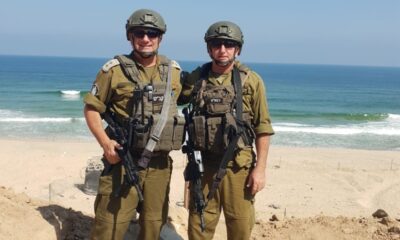
Israel

Killed and missing: Tanzanians shattered by Hamas
All that Clemence Felix Mtenga (22) and Joshua Loitu Mollel (21) wanted was to learn the art of agriculture in Israel, return to their home country of Tanzania, and provide for their families. But those dreams were destroyed on the morning of 7 October, when they were attacked by Hamas at Kibbutz Nir Oz in the Gaza envelope.
On 17 November, Tanzania’s foreign ministry announced Mtenga’s death. Though it was at first suspected that he had been taken hostage by Hamas, Israeli newspaper Haaretz reported on 18 November that he was murdered in his home on the morning of the attack, saying, “His body was conclusively identified only last week.”
“As a team leader of his group, I received with deep sadness the information of his death,” wrote Venance Fredrick on Facebook from Israel. “As a family, we’re heartbroken and we mourn his death. We Tanzanians are all bereaved. Rest in eternal peace CF Mtenga.”
Speaking to the SA Jewish Report from Israel, Fredrick said that Mtenga and Mollel were two of a group of 260 interns on a programme which is part of a co-operation plan between the governments of Tanzania and Israel. “It’s an agro-studies programme in Israel. The programme is an agriculture-based internship. We’re brought by the Tanzanian government to learn the sophisticated means of production in agriculture and agri-business,” he said.
“We were on the programme for the year 2023/2024. We travelled in groups: Clemence, Joshua, and I travelled to Israel on 13 September 2023 as the second group, and I was the team leader. Joshua and Clemence lived at Kibbutz Nahal Oz at the cattle farms since we arrived in Israel, but they weren’t living together.”
Describing his experience of the morning of 7 October, Fredrick says, “It was on Saturday morning of the Jewish holiday. My colleagues and I lived in Sderot, but some like Joshua were on the farm. Clemence was waiting for the afternoon shift with other Thais at their apartment.
“We were awakened by sounds of bombs, missiles, sirens, and strangers were shooting on the road to the Sderot police station. It was very scary.
“We stayed in a safe room for about a week, but our co-ordinator in Israel helped us to get food. He created a WhatsApp group chat that added all the Tanzanian students to know their whereabouts, but unfortunately, some of our friends reported the absence of two of our friends. Their WhatsApp last-seen information showed up at about 10:00. We checked them through their phone numbers and WhatsApp without success.”
He describes Mtenga as having “a good heart” and someone with big dreams, saying, “Many people loved him very much.” They grew up together in the same area. He knew Mollel less well, but got a very positive impression of him when they travelled to Israel together.
“Everyone on this programme is so enthusiastic about agriculture and agribusiness. Everyone’s wish is to invest in agribusiness,” Fredrick says.
The Tanzanian ministry is in contact with Israeli authorities about bringing Mtenga’s body back to Tanzania for burial.
This was the first time that both young men had travelled out of their home country. According to international media reports, Mtenga was shy and studious, and was excited to study in Israel. “He was so excited to learn and meet new people,” his sister, Alphoncena Mtenga, told news agencies. “He wanted to start his own agribusiness.”
She said Mtenga was the youngest of four siblings, and attended church every Sunday and sang in the choir. “He had a beautiful voice. He dreamed of being a successful person.”
Ezekiel Kitiku, a fellow Tanzanian intern, was living and working with Mtenga on Kibbutz Nir Oz at the dairy farm. As the sirens sounded on 7 October and he ran for shelter, he texted Mtenga and Mollel. “They told me that there were so many rockets coming from Gaza and that they were going to the shelters too,” he says. But a few hours later, they were no longer answering.
Mollel’s father, Loitu Mollel, says, “My son isn’t a warrior. He just went for training but is now in trouble.” He last spoke to his son on the evening of 5 October. “I’ve been going through difficult moments since then with sleepless nights. As parents, we’re living in very challenging times without any clue about the safety of our son.”
He describes his son as “polite, obedient, and serious about his work”. The eldest of five children, he had finished a diploma in agriculture studies from a college in the eastern Tanzanian city of Morogoro and left for Israel in September. The last words he said to his son were, “Be on your best behaviour because you’re somewhere new, and make the most of the internship.”
Mollel says that once the Israeli internship was finished, his son wanted to find his fortune in agriculture as either a farmer or an expert in the field. The Tanzanian government has been in regular contact with the family. So far, nine Tanzanians living in Israel have returned home with the assistance of the government.
Fredrick has decided to stay in Israel, and has been relocated to Afula in the north. “We now do our programme at Bustan Cooperative Packing house in the Jordan River Valley near the Israel-Jordan border,” he says, sharing photos of him and other interns working with maize in a factory.
To the South African Jewish community, he says, “They must know that they are in a safe place in Africa, and Africa is their home. Secondly, I need to say sorry for what happened in this sweet country [Israel]. Israel is safe and everything is going forward. I love the Jewish community with their golden hearts.”










